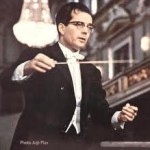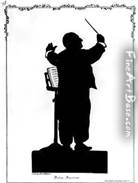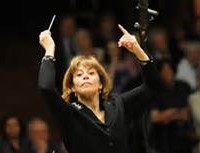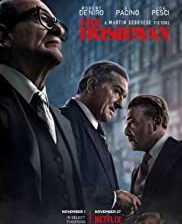- Two Thanksgiving Thoughts for the ACAPosted 11 years ago
- Shop til you Drop at the Healthcare Marketplace Part 2: Frustration!Posted 11 years ago
- An Early Casualty in the Affordable Care FightPosted 11 years ago
- Some Good News for a ChangePosted 11 years ago
Honoring Wolfgang Sawallisch

 The Philadelphia Orchestra is honoring its former music director Wolfgang Sawallisch by altering the program for its final concerts in May. Current intendant Yannick Nezet-Seguin has substituted the first movement Of Schumann’s Second Symphony, a Sawallisch specialty, to the concert of Dvorak and the Brahms Violin Concerto. I’m sorry we won’t hear it all. Sawallisch who died February 22, was music director in Philadelphia for 10 years. He was the director who led the orchestra into its second century and Verizon Hall. Speaking with orchestra members this year, I learned how much he was revered by them, a factor Boards of Director take for granted at their peril. I saw him conduct several times and felt he always delivered solid results in the repertory he felt best in, which was largely German and pre-WW2.
The Philadelphia Orchestra is honoring its former music director Wolfgang Sawallisch by altering the program for its final concerts in May. Current intendant Yannick Nezet-Seguin has substituted the first movement Of Schumann’s Second Symphony, a Sawallisch specialty, to the concert of Dvorak and the Brahms Violin Concerto. I’m sorry we won’t hear it all. Sawallisch who died February 22, was music director in Philadelphia for 10 years. He was the director who led the orchestra into its second century and Verizon Hall. Speaking with orchestra members this year, I learned how much he was revered by them, a factor Boards of Director take for granted at their peril. I saw him conduct several times and felt he always delivered solid results in the repertory he felt best in, which was largely German and pre-WW2.
 I would have said, until he got the call from Philadelphia, he qualified as one of the most under-rated conductors in the world, if not the prize-winner. He was an excellent accompanist at the piano too. Visits to the US were rare. He was ensconced in Munich at the opera for well over a quarter of a century until he fell out with the non-musical administrator. He had been a regular at Bayreuth and La Scala and was well known in London. Allegedly he offended von Karajan by turning down a contract at the Vienna Opera and appeared infrequently there and in Berlin. Their loss. Philadelphia came along at the right time for him, and he had a long Indian summer, retiring only when a tricky blood pressure problem made conducting difficult. It was the end of a career for Sawallisch and plunged the great Philadelphia Orchestra into the worst crisis in its history.
I would have said, until he got the call from Philadelphia, he qualified as one of the most under-rated conductors in the world, if not the prize-winner. He was an excellent accompanist at the piano too. Visits to the US were rare. He was ensconced in Munich at the opera for well over a quarter of a century until he fell out with the non-musical administrator. He had been a regular at Bayreuth and La Scala and was well known in London. Allegedly he offended von Karajan by turning down a contract at the Vienna Opera and appeared infrequently there and in Berlin. Their loss. Philadelphia came along at the right time for him, and he had a long Indian summer, retiring only when a tricky blood pressure problem made conducting difficult. It was the end of a career for Sawallisch and plunged the great Philadelphia Orchestra into the worst crisis in its history.
 He was one of those musicians who consciously tried to subjugate his own personality to the music-making. Haitink, van Beinum, Boult, Wand, Schuricht, Abbado and Skrowaczewski fall into this category. Monteux and Ormandy largely too. The Germans have a word for it— kapellmeister— not necessarily a compliment, but in his case and that of the others cited, simply a certificate of broad competence without a lot of fuss. He was certainly no glamour boy in the Bernstein-Karajan-Stokowski-Muti mold. No martinet either like Reiner, Szell, Dorati, Solti and Rodzinski. He could be teased. He was no mystical reverential figure like Furtwaengler, Giulini or Celibidache, at least, not until the end. He got results the old fashioned way, by hard work and knowing what he was doing, and how.
He was one of those musicians who consciously tried to subjugate his own personality to the music-making. Haitink, van Beinum, Boult, Wand, Schuricht, Abbado and Skrowaczewski fall into this category. Monteux and Ormandy largely too. The Germans have a word for it— kapellmeister— not necessarily a compliment, but in his case and that of the others cited, simply a certificate of broad competence without a lot of fuss. He was certainly no glamour boy in the Bernstein-Karajan-Stokowski-Muti mold. No martinet either like Reiner, Szell, Dorati, Solti and Rodzinski. He could be teased. He was no mystical reverential figure like Furtwaengler, Giulini or Celibidache, at least, not until the end. He got results the old fashioned way, by hard work and knowing what he was doing, and how.
 I was listening to his set of Schumann symphonies with the Dresden Staatskapelle recently and marveling again at how good they are, especially given that they were a last minute substitution for a planned recording of Wagner’s Rienzi. Nothing is taken for granted. Well-reasoned emphasis and accents are everywhere. The music moves. The various instruments are balanced well with each other, a big plus given Schumann’s thickish orchestration. The interpretataions have a lived-in feel to them. The sonics are great. The orchestra plays with precision that does not call attention to itself. If there is one movement that highlights the special talents of Wolfgang Sawallisch, it is the third Rhenish Symphony that was inspired by Schumann’s visit to a cathedral at the time of an archbishop’s installation. Rather than a heavy, portentious and foreboding atmosphere favored by most other interpreters, Sawallisch makes the music warm, inviting and reverential. You can understand at last why Schumann would want to capture the occasion in music. And you can understand why Sawallisch holds a special place in the hearts of those who played for him.
I was listening to his set of Schumann symphonies with the Dresden Staatskapelle recently and marveling again at how good they are, especially given that they were a last minute substitution for a planned recording of Wagner’s Rienzi. Nothing is taken for granted. Well-reasoned emphasis and accents are everywhere. The music moves. The various instruments are balanced well with each other, a big plus given Schumann’s thickish orchestration. The interpretataions have a lived-in feel to them. The sonics are great. The orchestra plays with precision that does not call attention to itself. If there is one movement that highlights the special talents of Wolfgang Sawallisch, it is the third Rhenish Symphony that was inspired by Schumann’s visit to a cathedral at the time of an archbishop’s installation. Rather than a heavy, portentious and foreboding atmosphere favored by most other interpreters, Sawallisch makes the music warm, inviting and reverential. You can understand at last why Schumann would want to capture the occasion in music. And you can understand why Sawallisch holds a special place in the hearts of those who played for him.
Curtis Rittenhouse







